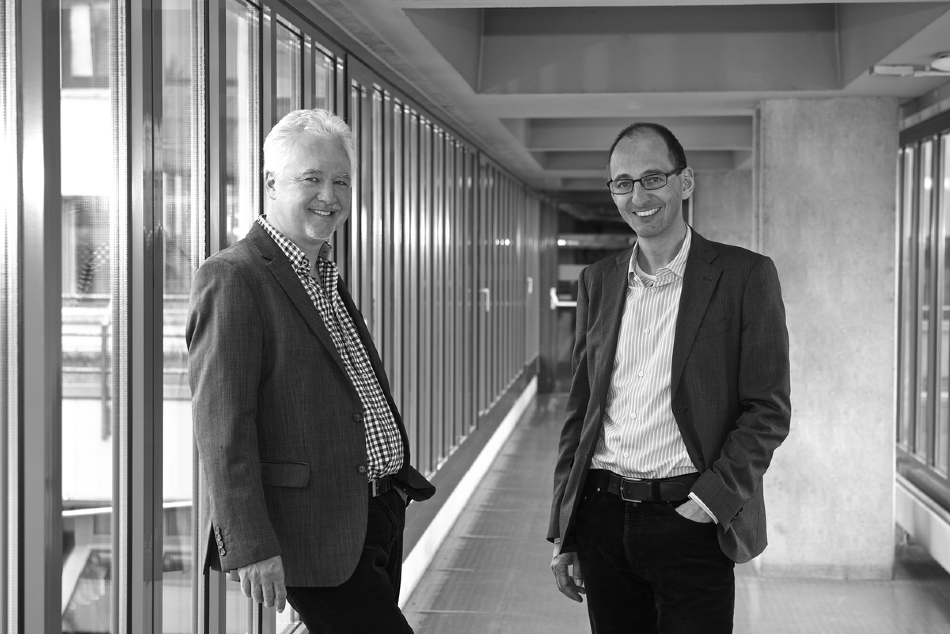Jun 18 2020
Can machines be creative and generate something that is truly new? Can they act as agents with the potential for autonomous action?
 Philosopher Professor Thomas Müller (right) and physicist Professor Hans Briegel receive funding from the Volkswagen Foundation for their study on the role of artificial intelligence (AI) in basic research. Image Credit: University of Konstanz.
Philosopher Professor Thomas Müller (right) and physicist Professor Hans Briegel receive funding from the Volkswagen Foundation for their study on the role of artificial intelligence (AI) in basic research. Image Credit: University of Konstanz.
Thomas Müller, a philosopher and professor from the University of Konstanz, and Hans Briegel, a physicist and professor from the University of Innsbruck, have received 825,000 euros funding over a four-year period from the Volkswagen Foundation via the funding initiative called “Off the Beaten Track.”
The aim of this project is to investigate the role played by artificial intelligence (AI) in fundamental studies. Another objective is to offer a conceptual framework for the evaluation, description, and regulation of today’s rapid technological development relating to the use of AI—an advancement that impacts the field of both economy and arts. The scientists, on their part, will work on explaining the concepts of creativity, agency, and authorship in studies.
Artificial Intelligence and the Concept of Agency
The funded project titled “The future of creativity in basic research: Can artificial agents be authors of scientific discoveries?” integrates techniques and methods from the areas of AI, physics, and philosophy in an interdisciplinary approach.
Both theoretical philosopher Müller and theoretical physicist Briegel, who has been holding a visiting professorship at the University of Konstanz since 2017—financially supported by the state of Baden-Württemberg—have been working together for nearly a decade.
Their mutual interest is focused on the concept of agency—known to be the reverse of an unregulated bodily reaction—and its use in the natural sciences. According to the researchers, this clarification is a matter of growing urgency, considering the advancements that are taking place in the natural sciences in the 21st century.
For instance, in research experiments, an increasing amount of work steps that were earlier conducted by humans are currently being outsourced to AI systems. This was the reason for raising the question: can AI systems serve as self-acting agents and make their own scientific findings?
If a telescope facilitates the discovery of a new Jupiter moon, the function of this telescope as an instrument cannot be disputed because it acts to widen the human senses. However, what happens when AI programs are also involved such as the learning technique Projective Simulation devised by Hans Briegel, or the supposed Generative Adversarial Networks (GAN), a unique blend of artificial neural networks?
Along with his collaborators, the physicist has been using the Projective Simulation method, for instance, to develop experiments that can create innovative quantum states in laboratory settings.
In this aspect, the AI system, which is based on the techniques of reinforcement learning, has progressed itself on the basis of the experiences made in the procedure. By collecting feedback on effective setups, the AI system has slowly learned which combination of experimental elements would often lead to the creation of such states.
We may not be far from an AI proposing experiments that will lead to the discovery of new quantum phenomena. This will then also raise the question what part we or the AI respectively have in such a discovery.
Hans Briegel, Physicist Professor, University of Innsbruck
Focus Areas of the Project
The new project is split into three major areas: certain case studies on the adoption of AI techniques in basic research in the field of physics, the role of experiments in AI-driven studies, and the question of authorship in AI-driven studies.
According to Thomas Müller’s opinion on the subject of authorship, “We don’t know if in ten years an AI will be named as the author on a research paper. What we are interested in is the underlying philosophical and conceptual question: At what point would we attribute to a system the ability, literally, to be curious, to be surprised, to intervene, to have a new idea?”
Collaboration Partners
Three doctoral candidates have now joined the scientists to work on each focus area. The scientists will work closely with working teams in whose research AI and machine learning play an integral role.
At the University of Konstanz, research teams from the Cluster of Excellence “Centre for the Advanced Study of Collective Behaviour” will also be involved as collaboration partners.
Additional collaborations have been scheduled in the area of climate research with Professor Tapio Schneider from the California Institute of Technology (USA), who is currently working on a novel climate model as part of the CliMA project.
Collaboration partners, among others, in the area of quantum optics, include the working team of Professor Markus Aspelmeyer from the Institute for Quantum Optics and Quantum Information of the Austrian Academy of Sciences (IQOQI) in Innsbruck and Vienna. The team is developing micromechanical experiments to measure ultra-weak gravitational fields.
Source: https://www.uni-konstanz.de/en/